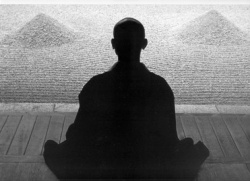Karma, Character and Behavior
by Jeffrey Hays
Karma is the means in which a person controls his or her destiny through good or evil deeds. Defined by some scholars as “the whole ethical consequences of one’s actions,” it is a moral force that survives death, determines one’s existence in future lives and has defined existence in past lives.
The concept of karma in Buddhism is similar to that in Hinduism and other Indian beliefs and is referred to once as “a long, long faring on, both for me and for you.” Karma is a Sanskrit word that means "work" or "action” and the “result of a work or action.” It describes a "reap what you sow" and the “cause and effect” doctrine in which good actions will be rewarded and bad actions will be punished on both universal and individual levels and influence one’s reincarnation. The emphasis in karma beliefs is not based on punishment for bad deeds but rather on improving one's karma by learning from one's mistakes and performing pure deeds, praying, mediating and taking actions to purify oneself.
The concepts of reincarnation, caste and karma are linked, with karma being carried over from one life to the next, determining the life or caste of a person in their next life. Based on whether their karma is generally good or bad, people are reborn in higher or lower castes. Some sinners come back as animals that befits their crimes. A meat stealer may come back as a jackal, a grain thief as a rat. The worst sinners are condemned to the lowest hells where they are eaten by birds or cooked in pots.
Buddhism and Hinduism teaches one to accept the injustices of life and be patient for rewards that may not materialize until their next life. High positions are not earned and low positions must be accepted. Some scholars have argued that beliefs in transmigration and karma originated as a way to explain social and economic discrepancies, to create an incentive to act morally and to offer people who were dealt a bad set of cards some hope in the future, in their next life.
It has also been argued that beliefs of karma and reincarnation encourage passivity with Hindus accepting their often miserable fate and taking little initiative to improve their lives or get rid of the poverty and misery around them. The beliefs also produce a resigned inshallah approach to life— with victims of bad events chalking up the events to bad karma, and in some cases even feeling relieved because they feel their bad karma has been used up and better things will happen in the future.
Parkish Louis, of the Indian Social Institute, a Delhi think tank, told the Financial Times, "People have been for centuries oppressed, passive, paralyzed and marginalized by beliefs of karma and destiny. People are accepting their misery in the name of religion and beliefs.” This attitude is also said to encourage irresponsibility and make people more accepting of corruption than they otherwise would be.
